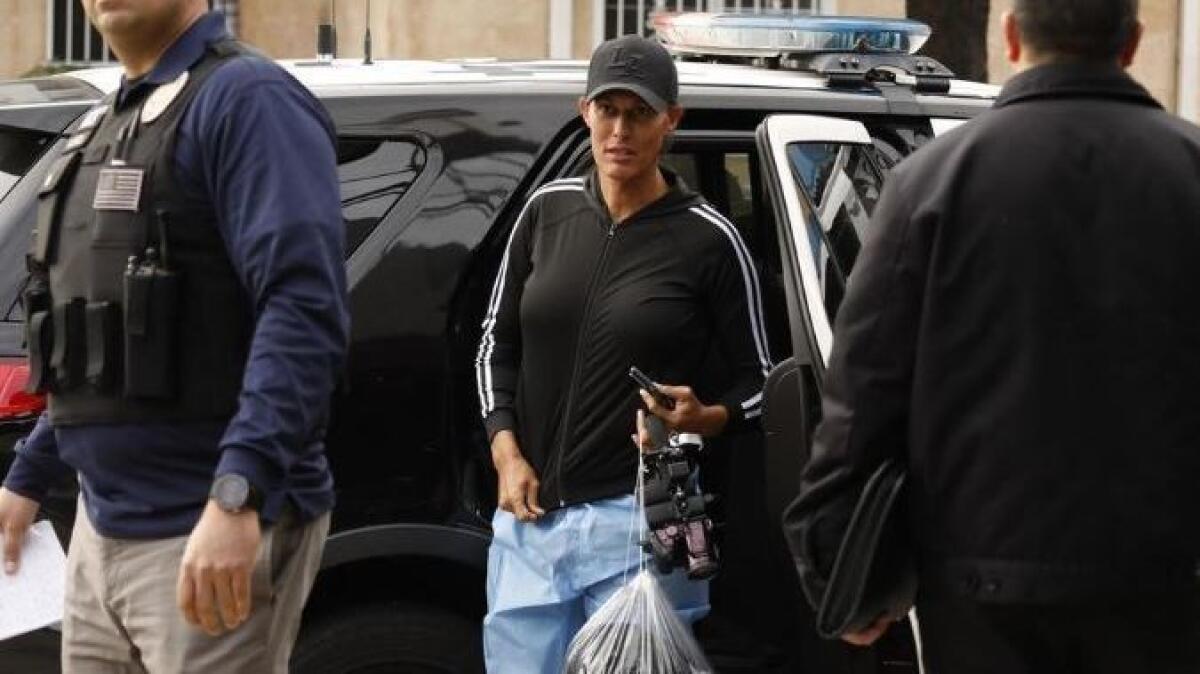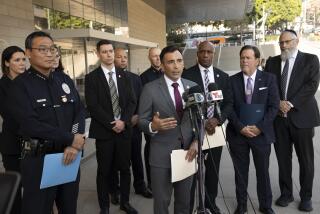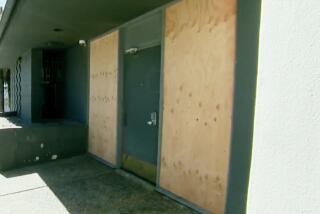How a popular YouTube activist got shot outside an L.A. synagogue

- Share via
In December, Zhoie Perez, a YouTube personality known for testing the limits of the 1st Amendment, stood on a sidewalk outside a church in Northridge filming with her iPhone.
When two young men approached to question her, Perez said, giggling, “We’re going to try the silent treatment.”
“Sir. How’s it going?” one of the men asked Perez, a transgender woman, who was in “boy mode” that day.
They stared at her, looking puzzled.
“Can we ask what you’re recording for?”
Getting no answer, they shook their heads and parted with a “God bless, you have a good day.”
She remarked to her phone how nice they were, because usually — predictably — they are not.
On Thursday, Perez got into an altercation that provoked a security guard at a Los Angeles synagogue to fire a shot that grazed her leg.
It was a bizarre cultural clash between a social media provocateur and a community on edge since the Pittsburgh synagogue mass shooting in October and rising incidents of anti-Semitism.
Perez filmed for 40 minutes outside the gates of the Etz Jacob Congregation/Ohel Chana High School building in the Fairfax District. As the security guard grew angrier, he filmed Perez in return, then pulled out his handgun.
“Get away from the door,” the guard said in one of two videos Perez posted to her “Furry Potato Live” YouTube channel. “You try one more time and I shoot you.”
The gun fired, and Perez repeatedly shouted that he shot her in the leg.
Police arrested the guard, Edduin Zelayagrunfeld on suspicion of assault with a deadly weapon. He could not be reached for comment Friday.
Perez was treated for her injury and gave a news conference later.
She is a self-proclaimed “1st Amendment auditor” — a phenomenon that started in the last two years. According to Brian Levin, director of Cal State San Bernardino’s Center on Hate and Extremism, the “audits” usually involve people provoking police or others near sensitive locations who might challenge their right to assemble or film in a public space.
“These are folks that like to leverage social media by going into public places, where they have a right to be, and testing the reactions to them by property owners and law enforcement,” Levin said. “What’s interesting is, it can go across the ideological spectrum. It’s a movement, but it’s broad.”
The movement has some roots among those who advocate for the rights to carry firearms openly, according to Levin, but the recent surge in “auditing” activity has more to do with large social media followings than any coherent political ideology.
Perez has more than 18,000 YouTube followers.
“The Constitution protects even obnoxious gadflies, but I do have to step back for a second and say at a time when Germany, France, Britain and the U.S. have seen significant spikes in anti-Semitic hate crime, that to do this, is certainly constitutionally protected, but also seems to skirt common sense,” Levin said.
In her videos, Perez seems to repeatedly prod at the edges of busy or popular locations around the Los Angeles area during interactions in which she starts out playfully confrontational but grows tenser as the minutes pass.
Just two weeks ago, she stood outside KTLA’s Hollywood studio, hovering near entrance gates for several minutes until she was approached by a security guard.
The guard, incorrectly, told Perez she was not allowed to take pictures of the studio lot, even though she was standing on a public sidewalk. After several minutes of polite banter, the guard begins to try and block Perez’s camera lens with his hand.
Once additional security is called to the scene, Perez begins to curse at the guards and make derisive comments about their weight. After roughly 30 minutes, two L.A. Police Department officers arrive and affirm Perez’s right to film as long as she stays off private property, a reaction that Levin says is often the desired endgame for 1st Amendment auditors.
After asking for the officers’ names and badge numbers, however, Perez calls the female officer a “tyrant” as she leaves the scene.
Thursday was also not the first time Perez’s actions provoked a violent response.
Late last year, Perez posted a video from outside the Islamic Center of Southern California in Koreatown — which received a phone threat about a shooting in 2016 from a man later found to have a cache of weapons when he was captured by the LAPD. She was pepper-sprayed by a security guard. The LAPD also responded to that scene, and Perez said she was on a public sidewalk when the guard sprayed her.
Although Levin did not know of Perez’s activities before Thursday, he warned that, in general, some provocateurs may simply latch onto the auditor movement to gain notoriety.
“Most of the people involved in this have a goal of sincerely illustrating 1st Amendment restrictions, but there are some who are more into goading conflict, and others who are into instant celebrity,” he said.
In some of her videos, Perez talked about the possibility of being killed, knowing she was provoking people, particularly police officers.
Although there was always the potential for violence, some security professionals questioned the temple security guard’s decision to open fire. Louis Perry, owner of Kadima Security Services, which offers security to dozens of synagogues in Los Angeles, said the guard should never have taken his gun out.
“What if it shot some kid on the street or an innocent bystander? What if he had killed the woman?” Perry said.
He said the onus is on the institution to make sure its security guards are properly trained and vetted.
Demand for armed security at synagogues is at an all-time high.
“In this new world, where terrorism [and fanaticism] reigns supreme….we must have guards,” said Rabbi Marvin Hier, dean of the Simon Wiesenthal Center and its Museum of Tolerance. “Now, every place is considered a battlefield.”
Hier said the overwhelming majority of Jewish institutions across the U.S. have hired armed guards. To do otherwise would be too risky.
Not only should the guards at synagogues be armed, he said, the building should have the highest security measures possible, including working cameras that monitor the area 24/7.
“After the attack in Pittsburgh, security has been a big concern for the Jewish community, “said Jason Freidman, executive director of a company that trains and recruits volunteers to protect synagogues. “The increase in demand has gone up 150%.”
He said, based on comments on news articles and Perez’s video, the incident has increased negative feelings toward the Jewish community.
Kristian Bikic, 27, a barista at Andante coffeehouse across the street from the synagogue, said he really liked the security guard who was regularly posted outside the synagogue.
“He was a really nice guy. We’ve observed him stop traffic for emergency vehicles when they passed through, sometimes five times a day,” Bikic said. “He seemed to know what he was doing.”
But he expressed deep concern about the shooting. He said he understands that having an armed presence might make the community feel safer, but it’s a “mixed bag” if weapons aren’t handled in a safe manner.
But Sam Sugarman, 30, a regular at Andante, said he was disturbed by Perez’s behavior on the video.
“It was them basically casing the temple,” he said. “I’m Jewish, so somebody filming the synagogue as if it’s some alien thing, with everything going on, that’s pretty scary. I don’t think the person was trying to be violent. I just think they were trying to get some sort of attention.”
He said he “could see how the security could have seen this person as a threat.”
Sugarman didn’t think the guard should have shot her, but added: “My hunch was that he reacted out of fear for the kids he protects and for the community.”
Times staff writer Benjamin Oreskes contributed to this report.
More to Read
Sign up for Essential California
The most important California stories and recommendations in your inbox every morning.
You may occasionally receive promotional content from the Los Angeles Times.














